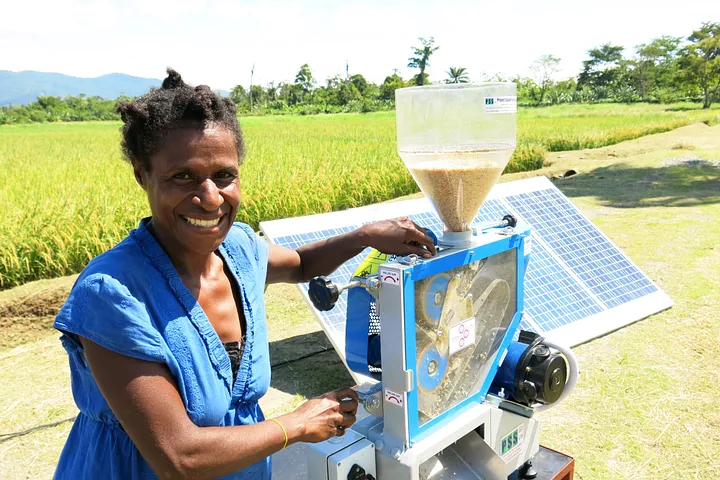Energy Efficiency and Social Impact Potential Drive Innovation at Solar Milling Company
We discuss how through research and development (R&D) funding we support off-grid companies like Agsol to improve product development through rigorous testing, improve customer engagement, and track social impacts through field pilot programs

By Wendy Hado, Associate at CLASP, Efficiency for Access Co-Secretariat
CLASP and Energy Saving Trust (EST) staff recently visited off-grid solar companies and customers across Kenya on behalf of the Low Energy Inclusive Appliances Programme (LEIA), a flagship initiative under Efficiency for Access. One of the first stops on the trip was the Nairobi office of Agsol, a company manufacturing and supplying agricultural machinery and solar technologies across off- and weak-grid markets.
It was always part of the vision that [solar powered milling equipment] would be an enabler of energy access,” says Matt Carr, Chief Technical Officer and Co-Founder of Agsol, while looking at the newly re-designed solar milling processor undergoing rotary configuration efficiency testing.
The processor is part of Agsol’s range of solar powered agro-processing machines designed for rural farmers and households in off-and weak-grid communities in Kenya, Zambia, and Tanzania. Although the company released its first generation of off-grid appropriate agro-processing machines back in 2015 in Papua New Guinea, designing for the East African markets has proved to be challenging.
To succeed in the East African market, the Agsol team quickly realised they needed to go back to the drawing board, and design a new efficient and affordable solar-powered milling machine in-house. Readily available processing machines, sourced from China and Thailand, were not appropriately designed to operate on solar power. Furthermore, Matt and his team found the energy efficiency among existing equipment to be low across the board. Agsol knew they had to spend resources into configuring the new line of solar-powered agro machines to become more efficient if the goal was to increase energy access and improve the livelihoods of rural users.

Agsol’s new milling equipment will focus on maize, an important staple crop in East Africa. The newly designed solar-powered mill uses a belt pulley system because there currently isn’t a high-speed DC system on the market in mass production, Matt explained. “To hit mechanical efficiency processing, you need a really high-speed motor, and the standard motors on the market don’t come at that speed. A belt and pulley system allows us to get to a high speed, but our goal is to move towards a direct coupled high-speed motor, as that would gain 15% in lost efficiency from a belt-pulley system.”
Aside from technology reconfiguration, conducting business in East Africa also required Agsol to take a different business model approach. In Papua New Guinea, Agsol packages solar-powered rice mill processors with photovoltaic (PV) panels, inverters batteries, and other components. However, the East African market is more mature in comparison, and working with an established solar house system (SHS) company provides new manufacturers with a quick way to scale production.
To date, Agsol has established business-to-business partnerships with seven SHS companies across Kenya, Tanzania, Uganda, and Zambia. This approach ensures their machines can reach people who need it the most. According to Matt, “[SHS] businesses already know their customer base and what their customer needs are. They are skilled in serving them. They already have internal consumer financing going on and have in-depth knowledge of customers’ repayment track, financial capability, and reliability along with mapping of the geographical area of service.”
For Agsol, however, it all comes down to the social impact the company set out to deliver, enabling access to energy and increasing incomes of rural farmers and individuals. Diesel-powered mills are most often located far away from rural communities, and women and adolescents are traditionally tasked with transporting produce to these mills to be processed. Women can travel up to one day out of the week to get maize processed; a time-consuming activity that often keeps women away from other productive activities, and results in girls missing school. Solar-powered mills, on the other hand, decentralize milling locations by allowing rural communities to have one or more locally-based machines. This will ultimately reduce the time and energy spent on drudgery for women and adolescents and increase their productivity.
Solar-powered agro-processing machines allow rural customers to efficiently access energy and process food while generating a reliable income. Maize is milled continuously throughout the year and accounts for almost 70% of all agriculture milling throughout key areas of Kenya. “Utilization is very important when it comes to solar [powered] machines [especially when considering the high associated CAPEX cost]”, says Matt. Agsol hopes to create a product priced at a point where the consumer can make repayments using the additional income they generate from their mill throughout the year. This would allow farmers to realize a return on their investment faster and achieve higher levels of access to modern energy.
Research and development (R&D) funding allows off-grid companies like Agsol to improve product development through rigorous testing, improve customer engagement, and track social impacts through field pilot programs. For Agsol, remote monitoring machines provide valuable data, including how much each machine is processing, and how many kilowatts are being used daily. Such information helps the company to capture important socio-economic benefits, such as additional income generated for farmers. In the future, Agsol hopes to overlay weather data in a cloud platform through machine learning to better serve its customers by providing information such as chances of cloudy days in a week. Such alerts allow farmers and community facilities to plan and provide better milling services for all.
Efficiency for Access is collaborating with Agsol to deploy 10 of its machines in a pilot program to collect user case experiences that will shape the final product design. To learn more about the role efficient off-grid appliances can play in delivering energy access and driving economic development in agriculture, sign up for the Efficiency for Access newsletter and follow the hashtag, #EfficiencyforAgTech, on Twitter.